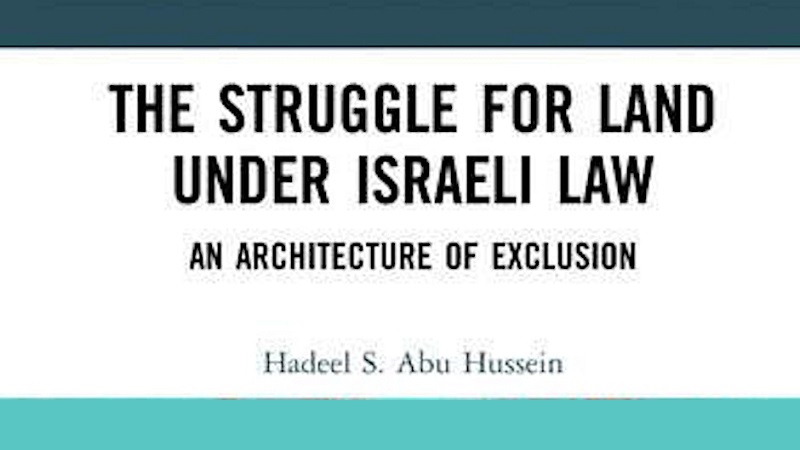Conversation with Dr Hadeel Abu Hussein & Professor Mohammad Shahabuddin
Wed, 19 Apr 2023 14:00 - 15:00 Israel Daylight Time (UTC+3)
Register here.
Conversation with Dr Hadeel Abu Hussein & Professor Mohammad Shahabuddin on the book ‘The Struggle for Land under Israeli Law’ (Routledge)
Hadeel Abu Hussein holds a PhD in Law from the National University of Ireland, Galway. Her research explores the evolution of land law in a settler colonial context and how states are constructing land regimes to exercise the exclusion of marginalised groups, engaging with the insights of legal geography theory. Hadeel’s book The Struggle for Land under Israeli Law, An Architecture of Exclusion was recently published by Routledge (2022).
Her experience as an academic researcher includes research fellowships and lectureships at the Max Planck Institute for Comparative Public Law and International Law and the Max Planck Foundation for International Peace and the Rule of Law, Heidelberg, Germany, at the Bonavero Institute for Human Rights, Oxford Law Faculty, Mansfield College, University of Oxford. Furthermore, at the Middle East Centre St. Antony’s College, the University of Oxford and the University of Zurich, Law School. And the International Institute of Social Studies (ISS) of Erasmus University Rotterdam, The Hauge Campus. and Al-Najah University, Nablus.
Give the gift of hope
We practice what we preach:
accurate, fearless journalism. But we can't do it alone.
- On the ground in Gaza, Syria, Israel, Egypt, Pakistan, and more
- Our program trained more than 100 journalists
- Calling out fake news and reporting real facts
- On the ground in Gaza, Syria, Israel, Egypt, Pakistan, and more
- Our program trained more than 100 journalists
- Calling out fake news and reporting real facts
Join us.
Support The Media Line. Save democracy.
Hadeel studied for LL.B and LL.M degrees at Tel Aviv University and is a member of the Israel Lawyers Bar. Prior to starting her doctorate studies in Ireland, she completed an Executive Education, ‘Leadership Program for Legal and Business Women, Legal and Business Fellowship’ at the Wharton Business School and Penn law at the University of Pennsylvania, USA. While at the National University of Ireland, she was a Doctorate Fellow, where she taught international human rights law and minority rights. Following that, she spent time as a postgraduate visitor at Max Planck Institute for Comparative Public Law and International Law, Heidelberg, Germany.
Her research deals with public international law, human rights law and comparative constitutionalism. Exploring the transformative nature of law itself, as it was applied as a critical instrument in the colonial context, is an attempt to analyse the extended discourse on law, power and colonialism. Hadeel’s research focuses on international legal discourse in the Middle East, Israel/Palestine, human rights, social justice and decoloniality. Her work is enlightened by and engages with Third World Approaches to International Law. Alongside her research, Hadeel practices human rights and constitutional law in Israel/Palestine. She collaborates with human rights organisations and international civil society organisations as a legal advisor and volunteer.
Mohammad Shahabuddin is a Professor of International Law & Human Rights at Birmingham Law School. Prior to joining Birmingham, he served Keele University as a Lecturer in Law from 2014 to 2016. He also held visiting professorships at Yokohama National University (2013-14) and Keio Law School (2014 & 2016) in Japan. He has been a Faculty Member for Harvard Law School’s Institute for Global Law and Policy (IGLP) Workshops since 2013. He is an Editorial Board member of the Asian Journal of International Law (Cambridge Journals).
Shahab was the Founding Chairperson of the Department of Law & Justice at Jahangirnagar University in Bangladesh during 2011-2013. In this role, he successfully led the curriculum development process for this new law school with the vision of introducing critical and interdisciplinary legal education in the country.
Shahab’s research has a global audience. He has given invited talks at leading institutions in 6 continents. He received the prestigious Leverhulme Trust Research Fellowship (2018-2020) and the Japan Foundation Fellowship (2016) in recognition of his innovative research in international law and human rights. He is the author of Ethnicity and International Law: Histories, Politics, and Practices (Cambridge University Press, 2016) and Minorities and the Making of Postcolonial States in International Law (Cambridge University Press, 2021). The latter is part of the prestigious Cambridge Studies in International and Comparative Law series. He has also published numerous original articles and chapters in influential journals and edited volumes on various aspects of the theory and history of international law and human rights. He is the editor of Bangladesh and International Law (Routledge, 2021). This edited volume with 27 chapters is the first comprehensive analysis of international law from Global South perspectives with specific reference to Bangladesh.
As a National Consultant of the United Nations Development Programme (UNDP), he conducted Bangladesh compliance studies on the International Covenant on Civil and Political Rights (ICCPR) and the Convention against Torture and Other Cruel, Inhuman or Degrading Treatment or Punishment (CAT) in 2011/12. He also served at the Bangladesh Institute of Law and International Affairs (BILIA) – the oldest civil society think-tank in Bangladesh – as its Research Director from 2011 to 2013.
The ‘Conversations with’ Series is hosted by Dr Shaimaa Abdelkarim at the School of Law, University of Birmingham under the Global Legal Studies Research Group. We enter the conversations in order to foster discussions on recent publications between legal academics and wider audiences and to contextualise the impact of publications in un/conventional spaces. Conversations will be recorded and available through the BLS Research Blog in due course. For inquiries, please contact s.abdelkarim@bham.ac.uk.



